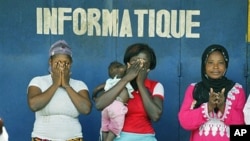U.N. human-rights investigators are calling for an end to impunity in Ivory Coast. They warn there will be no lasting peace or stability in Ivory Coast until those responsible for crimes during the post-election turmoil in the country are brought to justice.
The three-member International Commission of Inquiry has submitted its report on Ivory Coast to the U.N. Human Rights Council in Geneva.
The report finds many serious violations of human rights and international humanitarian law were perpetrated by different parties following the disputed November 28 presidential election. It said some might amount to crimes against humanity and war crimes.
International Commission of Inquiry Chairman Vitit Muntabhorn said in the first few months after the election, supporters of the duly elected President Alassane Ouattara were singled out for violence.
After the arrest of Laurent Gbagbo in March, he said those seen to be close to the former president were targets of reprisal killings. He said heinous violations have been committed on both sides of this political divide.
“I listened to accounts of people being burned alive several times, which were horrific," said Muntabhorn. "We saw villages being razed to the ground, attacks on different groups, political instrumentation of ethnicity leading to attacks on different ethnic groups, violence against women and children, and so on, particularly in the west and particularly in Abidjan.”
During its field visits, the commission collected information indicating 3,000 people may have died during the political and ethnic violence.
Since Gbagbo was arrested, the investigators note security in Ivory Coast’s commercial capital, Abidjan, and many places in western Ivory Coast has improved. They say human-rights violations are continuing, however, and this is of serious concern.
The report documents cases of widespread abuse, including retaliatory killings and summary executions, enforced disappearances, torture, arbitrary arrest, and rape.
The commission interviewed women refugees from western Ivory Coast who recounted horrendous experiences of having been raped in their villages and in their hideouts in the countryside.
Although rape appears to have been widespread, commission member, Suliman Ali Baldo, said the Commission does not have evidence that rape was used as a weapon of war.
“There is a dimension of ethnic targeting in the violence that occurred in Cote d’Ivoire, and a layer of that ethnic targeting is the rape of women as a measure of humiliation and an insult to entire community to which they belong," said Ali Baldo. "Therefore, this is a major feature of the violence.”
Among its many recommendations, the commission is calling for an end to impunity, and for discrimination and other underlying causes of the crisis to be addressed. It also urges the government to set up a truth and reconciliation commission to try to bring the divided communities together.
UN Investigators Call for End to Impunity in Ivory Coast
- By Lisa Schlein












